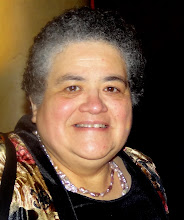Rosa Parks, Precious Friend
“The only tired I was, was tired of giving in.”
I am not given to hero worship. Having lived in Los Angeles for 20 years before moving east, we’d grown quite blasé about running into celebrities. But on March 19, 1992, Rosa Parks came to a bookstore in South-Central L.A. and I took my daughter, then eleven years old, to meet her.
We stood in the sun for about three hours in a line that snaked down the street forever. The folks in line were subdued, conscious that we were going to meet one of the great figures of history. I imagine that meeting the Dalai Lama, Thich Nhat Hanh, the Lubavitcher Rebbe, or perhaps, the Pope, arouses similar awe. Rosa Parks, a secular saint known for known for her heroism, the steel in her backbone, the purity of her purpose, and her absolute dedication to freeing her people, deserves the highest accolades.
The facts of her arrest are well known. On December 1, 1955, she boarded a bus in Montgomery, Alabama and refused to give up her seat to a white man. What is less known is that she was a member of the earliest civil rights groups in Alabama and that her refusal to move was not a random act. The NAACP had been looking for an unimpeachable figure to challenge the Montgomery bus rules that were more harsh and inflexible than any others and they found it in her slight figure. By the time that she staged her protest, she had already run afoul of that same bus driver for refusing to go to the back of the bus via the back entrance: Their rules required blacks to come in the front entrance, only to pay, then to exit the bus to board it by the back entrance lest they accidentally brush a white person, touching them. The depth of that hatred is hard for me to imagine.
The Civil Rights Movement is no longer as visible as it was in the 1950s and ‘60s despite the fact that the needs of African Americans and other racial and ethnic groups are still dire. In part, the press lost interest. In part, the expansion of the black middle class provided proof to the narrow-minded powers that be that all the wrongs had been righted. In part, the assassinations of the Rev, Martin Luther King, Jr. and Bobby Kennedy in 1968 cut the heart out of the movement and left us with leaders who were less charismatic. The racists in the U.S. government like J. Edgar Hoover of the FBI thought that by exposing Dr. King’s alleged marital infidelities, they discredited him and the movement. Somehow Justice Thurgood Marshall and Roy Wilkins, Bayard Rustin, Jesse Jackson, Cesar Chavez and Dolores Huerta did not pose the same threat to middle America that Dr. King did.
Americans value stability more than almost anything else except perhaps loyalty. Getting the civil rights movement off the front pages served to smooth over the injustices that continued just under the surface of America’s consciousness. Justice denied percolates from below and spills over if not attended to and it did so on many occasions after their killings. It burst out in 1968 with the Watts Riots, in 1994 when the police in the Rodney King case verdicts came down in Los Angeles; in the attempts to deny black students the right to attend state universities in Mississippi, Alabama and Georgia; in the refusal to desegregate public schools and the fights over busing students. In the late 20th century, the attempts to shut down any form of affirmative action have been refined to a high art by Bush and his lieutenants. Having co-opted the movement by appointing prominent blacks, Condoleezza Rice and Colin Powell, to high positions in his government, and praising Mr. Justice Clarence Thomas as one of the justices he most admired, Bush thinks the case is settled. His incoherent and impotent response to the tragedy in New Orleans that affected a disproportionate number of black people is evidence of his real view of black and poor people.
Yes, some things have changed, some wrongs have been rectified but there are so many injustices left to fix! Until our leaders ban any discrimination based on race, ethnicity, gender, sexual orientation, we are not free. We can honor the memory of Rosa Parks by committing ourselves to that goal, just as she did.
As I gaze at her firm signature on the autobiography that we purchased that day in 1992, I want to say, again, thank you, Mrs. Parks, for catalyzing our movement. Deep in my heart, I do believe, that we can overcome, someday.

